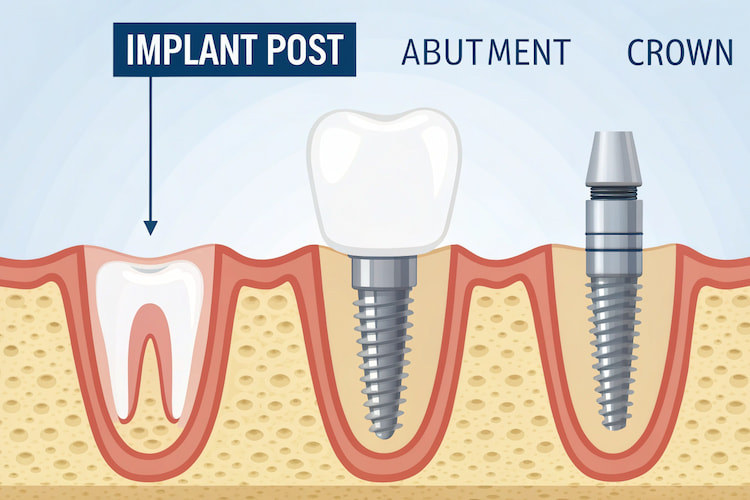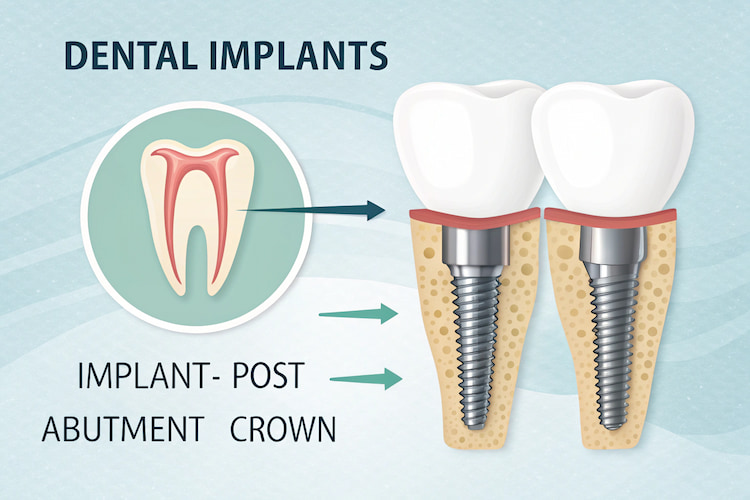Before getting a dental implant, there’s one important factor many people overlook: what not to do. While most people focus on choosing the right dentist or learning about the procedure itself, the habits you maintain before and after surgery can have an important impact on your results. Small but critical mistakes, like smoking, skipping prescribed medications, eating the wrong foods, or neglecting your oral hygiene, can slow down the healing process and, in some cases, even cause the implant to fail.
Most of these risks are easy to avoid if you know what to watch out for. In this guide, we’ll walk you through the key dos and don’ts before your dental implant procedure, explain why they matter, and give you simple, practical tips to make sure your implant heals properly and lasts for years to come.

What Are Dental Implants?
A dental implant is a small titanium post that’s surgically placed into your jawbone to act as a new tooth root. Once it’s secure, a custom-made crown or artificial tooth is attached, giving you a complete, natural-looking smile. Unlike dentures or bridges, implants don’t move, slip, or damage nearby teeth. They look and function like real teeth, and with proper care, they can last 20 years or more.

Common Mistakes to Avoid Before Surgery
Think of a dental implant as something you plant in your body, like a seed in soil. You wouldn’t plant the seed in rocky, dry earth and expect a flower to thrive. The same goes for your mouth. Healthy gums, clean teeth, and good general health create the ideal environment for your implant to succeed.
When you take the time to prepare correctly, everything becomes easier. The surgery goes more smoothly, healing is faster, and your chances of long-term success increase significantly. Skip that preparation, and you’re gambling with an investment that’s meant to last a lifetime.
Smoking and Tobacco Use
One of the biggest risks you can take before a dental implant is smoking. Nicotine reduces blood flow to your gums and slows healing. It also makes it harder for your bone to fuse properly with the implant, which is crucial for success. Research shows smokers are up to twice as likely to experience implant failure compared to non-smokers.
Even if quitting permanently feels overwhelming, stopping at least one to two weeks before the procedure (and staying smoke-free during recovery) can dramatically improve your outcome.

Poor Oral Hygiene
Another common mistake is neglecting your daily oral care. If you’re only brushing once a day or skipping flossing, now is the time to step it up. Bacteria and plaque can quickly cause infections near the implant site, and gum disease is one of the leading causes of implant failure.
Your dentist may recommend a professional teeth cleaning before your surgery. And at home, you’ll want to brush twice daily, floss thoroughly, and possibly use an antimicrobial rinse.
Ignoring Medication Guidelines
This one might not seem obvious, but it’s just as important. Some medications, especially blood thinners, aspirin, NSAIDs, or herbal supplements like ginkgo and vitamin E, can interfere with surgery. They may increase bleeding or interact with anesthesia.
You should always tell your dental team about any medications you’re taking, even over-the-counter ones. Never stop or adjust them on your own, but do follow your dentist’s guidance if they advise any changes before surgery.
For a step-by-step look at what happens during a dental implant procedure, you can check out this helpful guide from Verywell Health.
The Benefits of Proper Preparation
Taking the time to prepare your body and mouth before dental implant surgery can significantly improve your experience and long-term results. Let’s take a closer look at the specific benefits that come with proper preparation.

Improved Surgical Outcomes
When your mouth is clean, your gums are healthy, and your overall health is stable, the actual surgery becomes smoother and more predictable. Your dentist will be able to work with fewer risks and complications, leading to a more successful placement of the implant. A well-prepared patient gives the implant the best chance to integrate securely with the jawbone.
Faster Recovery
Proper preparation also means your body will heal more efficiently. Patients who follow pre-op instructions closely, quit smoking, manage medications, and practice excellent oral hygiene often experience less swelling, discomfort, and downtime after surgery. You’ll be back to your normal routine much quicker.
Reduced Complications
Most post-surgery problems, like infections, excessive bleeding, or implant rejection, are linked to poor preparation. Avoiding things like tobacco, ensuring good oral care, and managing chronic conditions like diabetes can significantly lower the risk of these issues.
Long-Term Implant Success
Perhaps the most important benefit of good preparation is that it sets your implant up for long-term success. An implant that heals well and remains stable from the beginning is far more likely to last for decades. Your effort before the procedure directly influences how long your new tooth will last and how well it functions over time.
Want Your Implant Done Right?
From the first consultation to the final crown, our skilled team ensures your comfort, safety, and long-term results.
What Happens If You Don’t Prepare Properly?
Unfortunately, skipping these basic steps can have serious consequences. If your body isn’t ready, your implant might not bond with the bone, leading to what’s called “implant failure.” This means it could come loose or fall out completely.
You’re also more likely to develop an infection if you go into surgery with poor oral hygiene or an untreated medical condition. And recovering from complications isn’t just painful, it’s costly and time-consuming.
So while it might be tempting to skip the prep, the risk simply isn’t worth it.
Who Needs Extra Preparation?
Some patients need to take a few extra steps before their implant surgery, especially if they have existing health issues. If you have diabetes, heart disease, or an autoimmune condition, you may need a tailored plan that involves your dentist and your primary care physician. These conditions can slow healing or increase infection risk.
Other situations may also call for additional treatment before surgery. For example, if you’ve lost a lot of bone in your jaw, your dentist might recommend bone grafting. If you’re getting implants in your upper jaw, a sinus lift may be needed. And if you have gum disease, it must be treated beforehand to prevent problems.
Your dental team will walk you through all of this, but knowing what to expect helps you feel more prepared.
To see how a dental implant procedure is done in real life, you can watch this step-by-step animation:
Planning and Budgeting for Your Implant
Dental implants are a long-term investment in your health and appearance. The dental implant cost typically ranges from $3,000 to $6,000 per tooth, depending on your location and specific treatment plan.
While it may seem pricey upfront, keep in mind that implants are built to last. They don’t require the ongoing maintenance that dentures or bridges might, and they help preserve your jawbone and facial structure over time.
Be sure to ask your clinic for a full cost breakdown. Some insurance plans may cover part of the procedure, and many offices offer flexible payment options to make things more manageable.
Final Thoughts
Your dental implant journey doesn’t begin in the dentist’s chair; it begins with how you prepare. The choices you make in the days and weeks leading up to your surgery will affect how well your implant heals, how long it lasts, and how happy you are with the results.
Avoid smoking, stay consistent with your hygiene, follow all medical advice, and don’t skip the planning phase. When you take care of the foundation, the rest will follow.
Ready to take the next step? Book a consultation today and start your implant journey with confidence.
FAQ
-
Can I eat before a dental implant?
Yes, if you’re receiving local anesthesia. A light meal a few hours beforehand is usually fine. But if you’re going under general anesthesia, your dentist will ask you to fast.
-
Should I smoke before the procedure?
It’s strongly discouraged. Smoking interferes with healing and increases your risk of complications. Ideally, quit a few weeks before and avoid smoking afterward too.
-
How do I prepare for dental implant surgery?
Maintain excellent oral hygiene, stop smoking, follow any medication instructions from your dentist, and get any pre-op cleanings or procedures your dentist recommends.
-
What medications should I avoid?
Always ask your dentist, but common ones to review include blood thinners, aspirin, NSAIDs, and herbal supplements. Never stop medication without your doctor’s approval.
Have a question or tip about preparing for dental implants? Share it below! We’d love to hear your experience.




